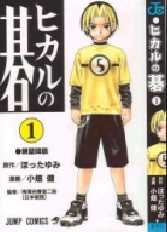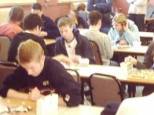Go in "The Ring of Water"
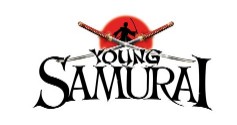 Read the Book?
Read the Book?
If you have not read The Ring of Water, the fifth book in the Young Samurai series, then beware there are spoilers below!
If you just want to read about the background to this book then visit our Young Samurai page or visit the Young Samurai website.
If you want to learn more about Go without reading the book, then just look at the right-hand column below, or start at our About Go section.
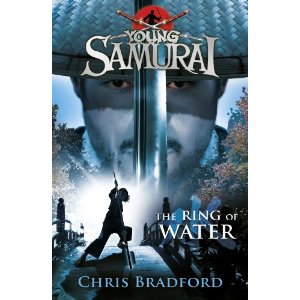 The Ring of Water
The Ring of Water
In the fifth Young Samurai novel The Ring of Water, Jack is challenged to a game of Go by a Japanese lord. The game forms a important part of the story in which Jack’s life and those of his friends are at stake if he loses. But if you have read the book already you will know that!
Jack goes to Nara. He is trying to find his stolen inro. Daimyo Sanada is obviously a big Go fan as shown by his obsession with black and white. He would probably have a Go themed inro. He would probably have a lot other Go artefacts like some of those found in British museums.
We wonder if the Daimyo would have ever seen a Chess or Draughts board with the black and white checked pattern, as in his garden, unless he had seen a Jesuit priest or other westerner with one, as those games were not known well in Japan at that time. Similarly Go was not well known in Jack's "uncivilized" homeland of England at that time. Indeed it was only in the 20th Century that the number of Go fans in the UK started to increase.
Naturally Ronin knew how to play, as Go was well practiced among the Samurai as a way of training their brains and learning war tactics. Go is not a single battle like Chess and the use of strategic positioning to defeat the enemy without coming to blows is a key feature of the game. We consider Go to be a martial art of the brain. As Ronin warns, Go can take a lifetime to master, but maybe you too have the mind of a samurai and can, just like Jack, quickly grasp its concepts?
Of course there is a lot of etiquette associated with Go, as mentioned in the book. How to sit at the board, how to hold and place the stones, and not rattling your bowl of stones to annoy the opponent, are all a part. At the end of the game it is usually the players that work out the score, without the risk of an onlooker disturbing the position. However experienced players, like Ronin, can work out the result in their head without the physical counting procedure and most could actually replay the game from memory if it was disturbed. Note that the giving of pass stones at the end is often a feature that is omitted, players simply saying pass, but it is common nowadays in UK tournaments.
More on the Five Go Facts1. Four Chess GamesIf four Chess games at once sounds complicated, never fear, Go can be played on smaller boards than the full 19 by 19. The best size to learn on is 9 by 9, which allows for a quick game. Although it is not a whole war, like the full board, there will still be a lot of battles on 9 by 9. Later you can move through 13 by 13 to 19 by 19 and appreciate the full game, just like Jack. If one player is not as good as the other, the weaker player (black) can place extra stones on the board at the start to make the game even, just like Jack did with his four stone start. 2. Number of StonesIf you are playing on a 9 by 9 board, of course you will need fewer stones, about 40 of each colour. Also, you don't need the slate and clam shell stones to play. Any counters will do. They don't even need to be black and white! We have seen sets made out of coins or sweets. Why not find some suitable counters, make a board and have a game? 3. Future of TibetNowadays Go is not played so much in Tibet. It is in China, where Go started, and Korea and Japan to where it later spread that it is played by millions of people. The top players of each country don't play for kingdoms any more, but do often play for the honour of their country in international matches. 4. Greatest Go player in HistoryDosaku as a member of one of the four Go houses, would have taken part in matches that were played to entertain the Shogun and the Emperor. The priests, samurai and other important people also played Go. In fact the BBC drama "The Shogun" aired in 2008 showed the great Tokogawa Ieyasu playing Go and planning his war strategies with his generals. Dosaku may have been the greatest player, but today's top players may have studied the game to an even greater level. Today they are professionals and can earn up to a million dollars a year, so it is worth getting better than the average 9 dan! It is of course not just boys and men that play Go; one of the top Japanese female players is called Akiko, just like Jack's friend. 5. Atom Bomb GameThe Atom Bomb Game, as described in the back of "The Ring of Water", is a well known part of the history of Go. In 2005 we put on an exhibition about the game at the Imperial War Museum in London. Two Japanese professionals came to visit and help make 1000 paper cranes to send to Hiroshima. You can see the news report and pictures on our News Pages. You can also see one of the traditional goban (floor Go boards) that both the Atom Bomb Game players and Jack would have played upon. |
Learn to Play Go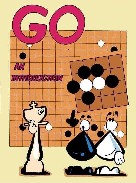
If you want to play Go like Jack, and maybe get to fight a great battle on the board, then we recommend looking at our "stoNes" Cartoon Introduction. (Printed copies are also available from us.) If you read up to page 6 then you are ready to play "Capture Go", which you can do on our junior minisite. Once you have mastered capturing and read the whole leaflet you can play against someone else or a computer program. One we recommend is Igowin. There is a lot more on learning elsewhere on our website, so please take a look around. Ways to More Go
|
If you have any comments, please email the webmaster on web-master AT britgo DOT org.

